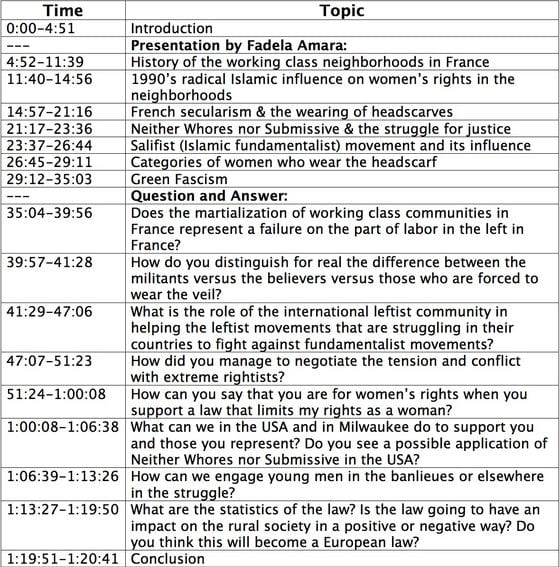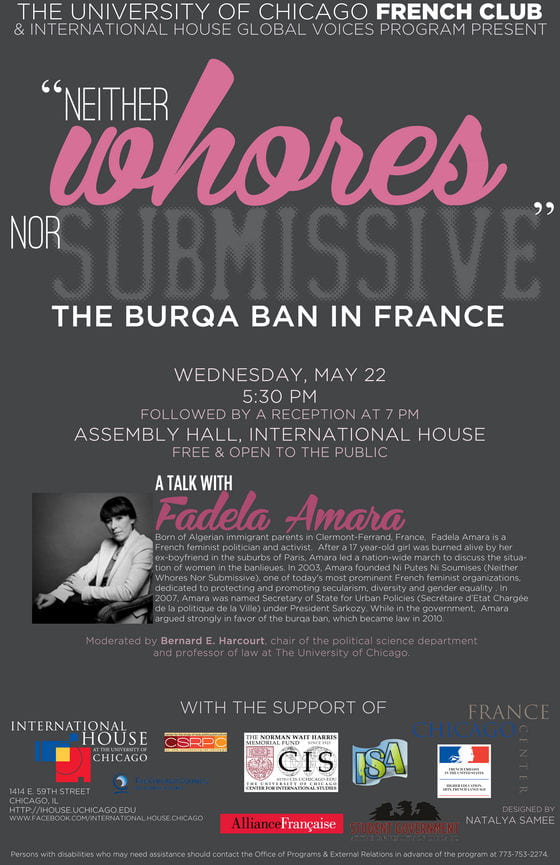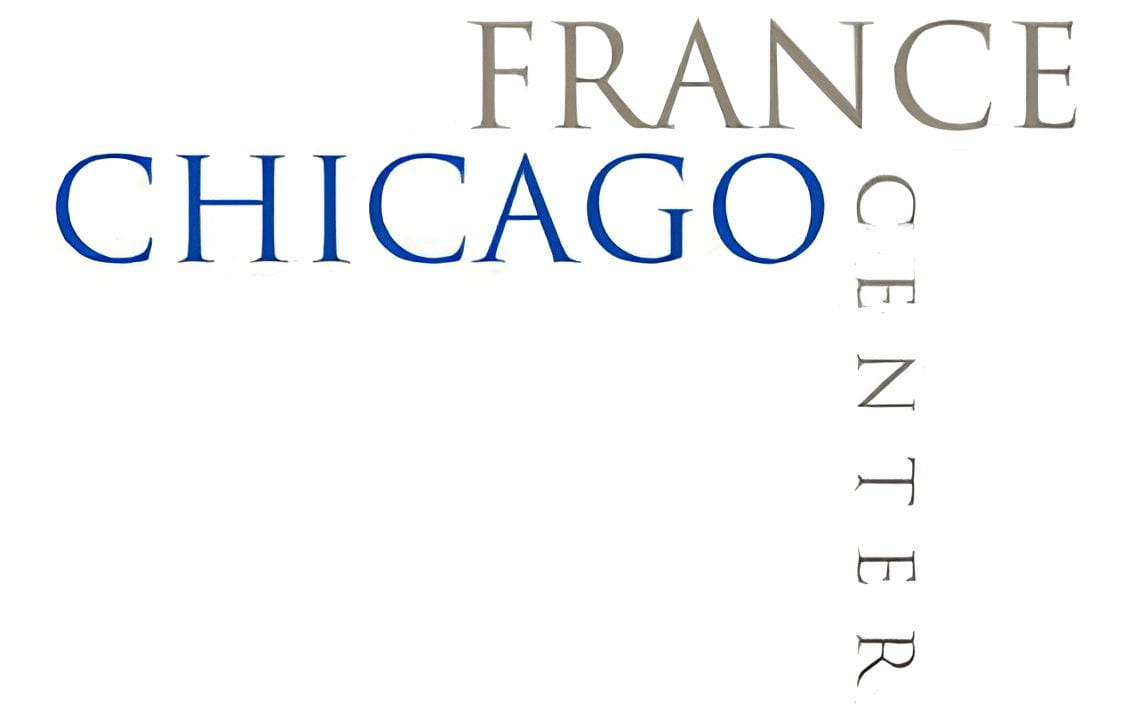Neither Whores nor Submissive: The Burqa Ban in France
May 22, 2013
1 hour and 20 minutes
International House, University of Chicago
Program Overview
In September 2010, the French Parliament made it illegal to wear face coverings in public areas, with 70 percent of public support. The ban received vigorous applause from the prominent French feminist organization Ni Putes Ni Soumises (Neither Whores Nor Submissive), which considers the burqa a tool of female oppression.
In this talk, Fadela Amara (Ni Putes Ni Soumises founder and former French minister) describes the rise of Islamic fundamentalism in the predominantly poor immigrant neighborhoods surrounding French cities (banlieues) that led to the ban on face coverings. She explains why she considers the wearing of the burqa in public to be both oppressive for women and an assault on the values upon which the French Republic is founded. Furthermore, she discusses the aftermath of the ban in France, the goals that Ni Putes Ni Soumises continues to pursue, its partners at home and abroad, and the impact of the national and international political climate on men and women in the banlieues. Following the talk, Bernard Harcourt moderates a discussion that mixes questions from the Chicago audience with those submitted online by remote audience members in Minneapolis, Milwaukee, and Cincinnati. Deborah Joyce serves as the interpreter throughout.
Outline of the Program

About Fadela Amara

Born of Algerian immigrant parents in Clermont-Ferrand, France, Fadela Amara is a French feminist politician and activist. After a 17-year-old girl was burned alive by her ex-boyfriend in the suburbs of Paris, Amara led a nationwide march to discuss the situation of women in the banlieues. In 2003, she founded Ni Putes Ni Soumises (Neither Whores Nor Submissive), one of today’s most prominent French feminist organizations, dedicated to protecting and promoting secularism, diversity, and gender equality. In 2007, Amara was named Secretary of State for Urban Policies (Secrétaire d’Etat Chargée de la Politique de la Ville) under President Sarkozy. While in the government, Amara argued strongly in favor of the burqa ban, which became law in 2010.
Discussion Questions
1. How does the situation of women who wear the veil or burqa in France compare to that of women who wear these items in the United States?
2. What is the importance of men in movements such as Neither Whores nor Submissive?
3. How do you see the freedom or lack of freedom of women in relation to clothing in your own society?
4. What is the international impact of the French law making it illegal to wear the burqa in public areas?
5. What do you think of Fadela Amara’s three categories of women (militants, believers, and those forced to wear the headscarf)?
6. Referencing the debate between Fadela Amara and the Muslim student, do you see the headscarf as liberating or oppressing for women?
Online Resources for More Information
French activists lifts the veil on the burqa ban (The Chicago Maroon)
Before the event on May 22, 2013, the University of Chicago newspaper interviews Fadela Amara (with Eve Zuckerman as a translator) about her work and the situation in France. Amara speaks about the progress of “Ni putes ni soumises,” the effects of the burqa ban on Muslim women in France, her inspiration for activism, the wearing of the burqa by choice, her argument against the veil, and the current role of Ni putes ni soumises.
This article from September 2013 reveals that a “Charter for Secularity in School” poster will be on display in each public school in France. This is an effort to promote understanding and enforcement, but some could feel that it targets Muslims. The article goes on to explain some of what the charter says and its practical consequences. It concludes by raising questions about the law’s true secularity.
A Daughter of France’s ‘Lost Territories’ Fights for Them (The New York Times)
This profile of Fadela Amara from 2008 by the New York Times describes Amara’s work, influence, and history, especially concentrating on her role in the working-class suburbs of France. It explains her actions to combat racism and to advocate for women’s rights, including details about her work with the daycare center Baby-Loup.
A French woman of Pakistani origin argued for her right to wear the veil by testifying that she was not forced to wear it and would willingly remove it for security purposes. Some argue that the prohibition of the veil stigmatizes Muslim women. This article reveals how some believe the law banning religious symbols in schools imposes secular values upon religious minorities.
In this article from 2006, Rose George describes the inequality and lack of women’s rights in the French banlieues, which she refers to as ghettos. Amara criticizes the feminist movement of the 1970’s that often forgot about the problems in the banlieues; it is in these forgotten areas, that Ni putes ni soumises wages its battle. The author relates Amara’s position towards Islamists. At the end, Amara emphasizes her intent to keep fighting against all those who oppose women’s freedom.
French veil law: Muslim woman’s challenge in Strasbourg (BBC News)
Six months after the program with Fadela Amara at the University of Chicago, a young Muslim woman argues in the European Court of Human Rights for her right to choose to wear the niqab (a variation of the burqa). The article lists other notable violations of the ban in 2013. A video about opposition to the law accompanies the article. Additionally, the article contains an infographic that distinguishes between the different types of head coverings.
The Salifist Movement (PBS Frontline)
This article by Bruce Livesey provides background on the Mulsim fundamentalist Salifist movement in Europe, a movement that calls for a return to what it considers to be authentic Islam. The author explains the origins and beliefs of Salafi Jihadism, whose adherents account for less than 1% of Muslims globally, and describes another group known as Takir wal-Hijra. The article concludes with concerns about the spread of these fundamentalist ideologies.
Ni putes ni soumises website (in French)
This is the official website of Ni putes ni soumises, the organization founded by Fadela Amara. The website is entirely in French. It contains current news about the organization and the history of the movement, as well as additional resources.
Other Resources
This book by Amara and Zappi starts with the immolation of a young Muslim girl in the French banlieue and the mobilization that followed. It was published in France in 2003, and since then it has been translated and made available to English speaking audiences.
Documentary: I Wasn’t Always Dressed Like This (2013, by D-AEP)
The documentary endeavors to present a comprehensive view of the issue of head coverings by portraying the lives of three different Muslim women who wear them.
This program made possible with the support of the following
Consulate General of France in Chicago
Alliance Française in Chicago
France Chicago Center
UChicago French Club
Center for International Studies
Center for the Study of Race, Politics, and Culture
University of Chicago Student Government
International House Global Voices Program
International Students Association
Chicago Council on Global Affairs

